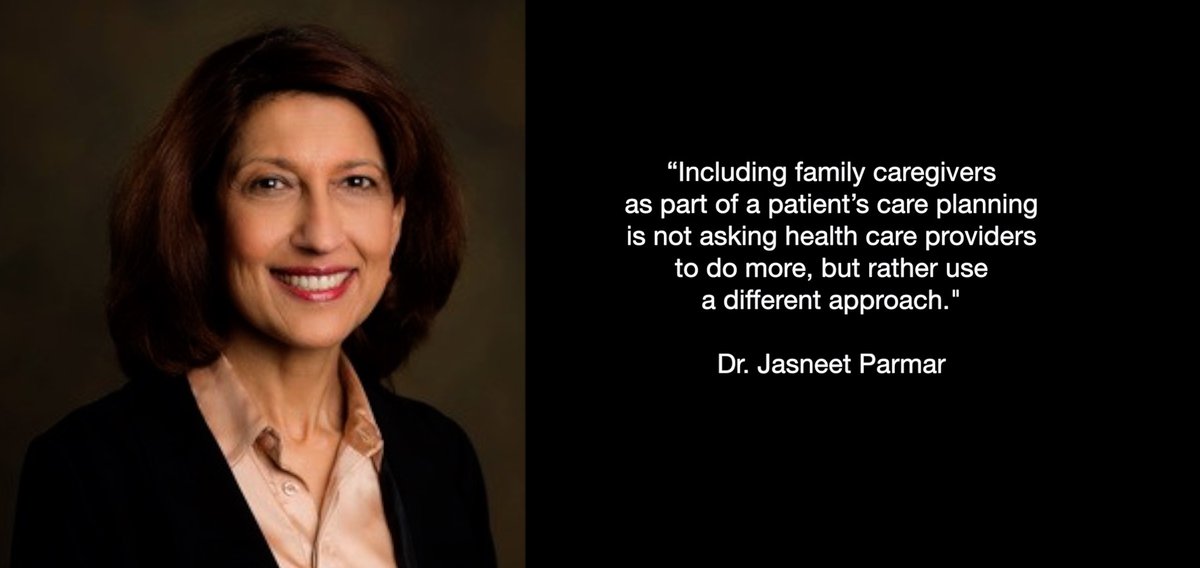Family caregivers go by a lot of names, and whether you call them family caregivers, carers or care partners, they play an essential role in our health care system. Our health care teams will find themselves interacting with them and needing them more and more in the months and years to come.
Just as physician practices have adapted to work more effectively with multidisciplinary teams, they must also prepare to accommodate the presence of, and appreciate the role of, family caregivers. Enter the Caregiver-Centered Care Competency Framework and Education for Health Providers to Support Family Caregivers.
The framework emphasizes the competencies that health workforce must acquire to establish and maintain relational skills, such as communication, collaboration, partnering with and engaging family caregivers to help them not only to sustain care but also to maintain their own health and well-being.
Dr. Jasneet Parmar, a Care of the Elderly physician with the Edmonton zone Specialized Geriatrics Program, as well as a professor with the U of A Department of Family Medicine, was the lead author on the framework.

“Including family caregivers as part of a patient’s care planning is not asking health care providers to do more, but rather use a different approach,” notes Dr. Jasneet Parmar. “In the long run, factoring in their needs can improve patient outcomes, sustain care, and help them maintain their own health and well-being. Our health care providers will find this education helps them in establishing meaningful relationships and maximizes the benefits of having caregivers as part of the team.”
On the other hand, Dr. Parmar goes on to explain, caregiver-centered care does not mean shifting of care, care management, or advocacy responsibilities to families. It’s about developing a collaborative working relationship that supports both patients and their caregivers.
Why these competencies are important
As explained in Supporting seniors and their caregivers (May/June issue), caregivers contribute $97.1 billion to the Canadian economy in free work, and they provide 90% of care in the community. They are essential and yet, they are often overlooked.
Caregivers are under tremendous stress, including financial strain, balancing out-of-pocket expenses or helping to support their family member or friend. The financial, time and emotional pressures affect their physical and mental health, and it’s critical that the health care system better support caregivers: without them, our health care system is unsustainable.
The six competencies
Health care providers greatly benefit from having the knowledge, skills, attitudes, and values that are necessary to incorporate caregivers into care planning. The framework’s curriculum covers six competency domains that shape caregiver-centered care practice:
- Recognizing the caregiver role: Understanding that caregivers are a diverse group that play a valuable role in the health care system, and sometimes at great cost to themselves.
- Communicating with family caregivers: Actively listening and providing information in a timely fashion. Knowing how to adjust communications in a way that caregivers can understand and makes them feel heard.
- Partnering with family caregivers: Understanding the benefits of and working to include family caregivers in the care plan.
- Fostering resilience in family caregivers: Helping them to identify their needs from their lens. Knowing how to support caregivers in their role and promote their well-being.
- Navigating the health and social systems and accessing resources: Considering the caregiver as well as the patient when making referrals and helping them overcome barriers to resources.
- Enhancing the Culture and Context of Care: Recognizing and role modelling the health care provider’s role in caregiver-centred care.
These competencies can become a natural part of building relationships with patients and their caregivers. Family caregivers are the backbone of the healthcare system and a critical resource.
A recent study of the role of caregivers confirms that “their willingness to provide care and their effectiveness in doing so will depend on fundamental changes in the extent to which we formally recognize them as key contributors to the health of their relatives, integrate them into the formal provider systems, and support them to do their job.”1
Every health care provider has a part to play in acknowledging and supporting our family caregivers.
Find more information at caregivercare.ca.
About the Caregiver-Centered Care Competency Framework
The Caregiver-Centered Care Competency Framework development was a multi-step iterative consensus building process that culminated in a Modified Delphi Process with key stakeholders validating the competency indicators.2
More resources
Evaluation of the Foundational Education
Parmar, J.; L’Heureux, T.; Anderson, S.; Duggleby, W.; Pollard, C.; Poole, L.; Charles, L.; Sonnenberg, L.; Leslie, M.; McGhan, G.; et al. Optimizing the integration of family caregivers in the delivery of person-centered care: Evaluation of an educational program for the healthcare workforce. BMC Health Services Research 2022, 22
Other open source publications
Schulz, R.; Beach, S.R.; Friedman, E.M.; Martsolf, G.R.; Rodakowski, J.; Everette James, A. Changing structures and processes to support family caregivers of seriously ill patients. Journal of Palliative Medicine 2018, 21, S36-S42, doi:10.1089/jpm.2017.0437.
Parmar, J.; Anderson, S.; Duggleby, W.; Holroyd-Leduc, J.; Pollard, C.; Brémault-Phillips, S. Developing person-centred care competencies for the healthcare workforce to support family caregivers: Caregiver centred care. Health and Social Care in the Community 2021, 29, 1327-1338, doi:10.1111/hsc.13173.
Banner image credit: Mohamed Hassan, pixabay.com

